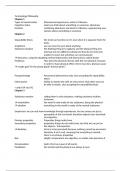Terminology Philosophy
Chapter 1
Types of mental states Phenomenal experiences; what is it likeness
Cognitive states what you think about something or someone; aboutness
Emotion combining aboutness and what is it likeness, experiencing your
opinion about something or someone
Chapter 2
Separability thesis the mind can function on it’s own when it Is separate from the
body
Scepticism we can never be sure about anything
Substance dualism the thinking thing (res cogitans) and the physical thing (res
extensa) are two different substances that do not need one
another to exist, but somehow can communicate
Descartes, using the doubting method (obstructive and destructive), radical doubt
Problems; How does the physical interact with the non-physical, because
in order to have physical effect, there must be a physical cause
maybe god? Or the pineal gland? Animal spirits?
Parapsychology Paranormal phenomena exist, thus accepting the separability
thesis
Clairvoyance Ability to obtain info with an extra sense, that other may not
be able to obtain, also accepting the separability thesis
= with EVP and ITC
Chapter 3
Substance monism stating there’s only substance, making substance dualism
irrelevant
materialism the world is only made of one substance, being the physical
idealism everything in the world is made of the mental substance
Empiricism; we can only have knowledge through experiences, but our senses are just a
perception of the real world, therefore objects have two kinds
of properties:
Primary properties Properties things really have
Secondary properties properties things do not really have, but that we can put on
the objects / introspection
Berkeley: to be is to be perceived (because nothing cannot be perceived,
therefore it isn’t real), meaning that everything is mental,
there’s no primary properties
But: Height, temperature are objective, no matter who perceives it
Occasionalism God is the true cause of all events
Parallelism the mental and the physical are always in sync
, Chapter 4
Behaviourism Takes the mind out of the mind-body problem
Describing, predicting, and controlling behaviour
All behaviour is reflex-like, there’s only input and output
Good, because: behaviour is equal to the mind, so asking about the mind is a
categorical mistake Ryle
The mind simply is behavioural dispositions, because we
cannot focus on everyone’s private mind anyway
Philosophical behaviourism a mental state without behaviour is meaningless
Psychological behaviourism its no use studying the mental states or mind if there’s no
behaviour along with it
Behavioural dispositions The pattern of behaviour we have under certain circumstances
= a different definition of the mind
Methodological: In response to science in itself, introspection is not sufficient,
cannot be verified, but behaviour can be observed
Logical positivism For a sentence to be meaningful for science, it should be
meaningful, so we should use observations only when
describing mental states, based on empiricism
Bad, because Does it really describe it, and to what extend?
We cannot explain what the thinker is doing, meaning we
cannot describe thoughts, or dispositions you do not want to
show
Chapter 5
Identity theory : All mental states are identical to certain brain states
certain because all mental states are brain states, but not every brain state is a mental
state, because they’re not conscious
Good, because: Passes Ockham’s razor
When you ask the causal role for mental states (like pain) it
would be the brain state, because when pain is inflicted it is
processed in the brain before we know ( empirical evidence,
causal role)
Parsimony
Bad, because; It violates Leibniz’ law, because mental states are brain states,
but not the other way around state, because they’re not
conscious
If identity can be transitive (A=B, B=C, A=C), this would mean
brain states of different creatures are equal to human brain
states, which is not true
identity is not supervenient, but rather realizable?
Brain states have a location, but mental states do not
Mental brain states and brain states do not have the same
properties semantically





